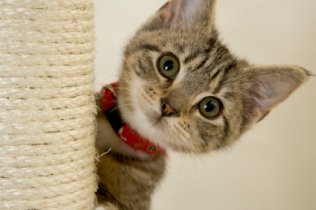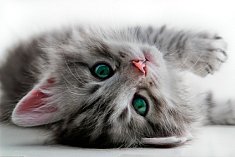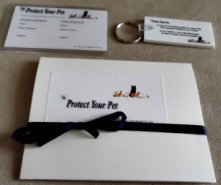|
Feline Sneezing: Should You Be Concerned?

Feline sneezing is usually caused by a source irritating the lining of your cat's nose, your cat's body then response by sneezing in an attempt to get rid of whatever is causing the irritation. Sneezing is both common in humans and cats, most cats do occasionally sneeze and there generally is no reason to be alarmed. However if your cat is consistently sneezing, several times per day or on a daily basis, it's time to take your cat to the vet to make sure that there isn't a serious underlining cat health problem.
Causes
Feline sneezing is caused by a variety of reasons. Similar to humans, cats often sneeze when small objects are lodged in or irritate their nasal passageways. Common objects are small blades of grass, dust, or other particles such as fine cat litter. If your cat is sneezing regularly, then pay attention to when they sneeze. For example, a cat who sneezes just after using the litter box is a good indication that your cat litter. is either too dusty, or contains a minor allergen upsetting your cat’s sinuses. You may want to switch to a litter that isn't as dusty, which should reduce or eliminate your cat's allergic reaction. If your cat sneezes after being outside in the lawn, your cat may be allergic to grass and/or weeds. Cat allergies are a lot more common that many cat owners realize, cats can be allergic to grass, smoke, cleaning products, perfume, mold, so paying close attention to when your cat is sneezing can help you and your vet determine the source that is causing the sneezes. Another cause of feline sneezing is, surprisingly, dental. If the third upper premolar tooth or adjacent teeth becomes infected, abscesses may form and press into and affect your cat’s sinuses. If your cat is sneezing in combination with pawing at their face, refusing to eat, or hiding, they may be experiencing pain due to an infected or abscessed tooth. Take your cat to the vet to make sure that their sneezing is not the result of a cat dental health problem. Regular dental hygiene routine and dental checkups at the vets both play an important role in keeping your cat's teeth healthy.
Respiratory Infections
Feline sneezing can also be caused by a upper respiratory infections such as; rhinotracheitis and calicivirus. These respiratory infections are common in younger cats with weaker immune systems or cats coming from a shelter environment where they’ve been exposed to other cats and possible other cat illnesses. Along with sneezing, cats with upper respiratory infections may experience inflamed watery eyes, nasal discharge and even a fever. It is very important to take your cat or kitten to the vets if they are consistently sneezing for a couple of days never diagnose your cat or simple concluded that it's normal. Although the occasional sneezing does not call for concern, consistent daily sneezing for a couple of days requires a visit to the vet. The Feline Distemper, one of several cat vaccines, is given at 8-10 weeks, 12-14 weeks, one year and every 3 years after, and helps to protect your cat against feline respiratory infections.
Keep Records
Keep in mind that not all sneezes are the same, and it’s important to pay attention to your cat’s sneezes, so that you can inform your veterinarian. It’s important to observe and keep record of when your cat sneezes, if your cat is having dry or wet sneezes, sneezes accompanied by a discharge of mucous, if your cat is also frequently coughing, if their eyes are discharging fluids, and any changes in your cat’s behaviour or mood. Keeping track of this information will greatly assist your vet in finding out the source of your cat’s sneezing.
Treatments
A trip to the veterinarian can result in a number of different treatments. For less threatening causes of feline sneezing such as allergic reaction, your vet may recommend the removal of the source causing the reaction. If your cat is sneezing every time he/she uses the litter box then your vet may recommended changing the type of litter, this process may take a bit of observing and recording the times when your cat sneezes on your part and removing each source or removing your cat from the source that may be causing the problem. Determining what your cat is allergic to is a timely process but an important one to stop your cat from sneezing and reacting to those allergens. If your veterinarian determines that the source of the problems is an abscessed or infected tooth, then your cat will have to have dental work to remove that tooth. In cases when the cause of the sneezing is due to a fungal or bacterial infection then your vet may prescribe antifungal drugs or antibiotics. In more severe cases of sneezing where the cause is usually a respiratory infection, hospitalization may be required, especially if your cat stops eating and drinking, in order to prevent dehydration.
Similar Topics
Common Elderly Cat Health Problems - Discussing several different health problems that affect senior cats and treatment options.
Feline Food Allergies: Symptoms, Diagnosis, Treatments- Discussing how to recognize if your cat is experiencing symptoms of cat food allergies and different treatment options.
Cat Flea Treatment- Cat fleas can be both irritating and annoying to your cat, here are some effective flea treatments to get rid of those pesky fleas.
Return From Feline Sneezing To Cat Health Home Page
|
Protect Your Pet Card
In Case Of An Emergency The Protect Your Pet Card Lets Emergency Services Know That You Have Pet/Pets Waiting For You At Home, Making Sure That Your Pets Are Cared For.
Get Your Card Today!
Win A Free $250 Petsmart Gift Card For Your Cat!
Must Be A US Resident
Click Here To Easily Enter For Your Chance To Win.

"There are few things in life more heartwarming than to be welcomed by a cat."






